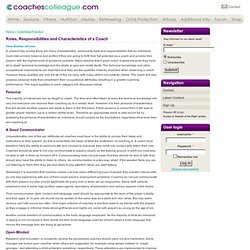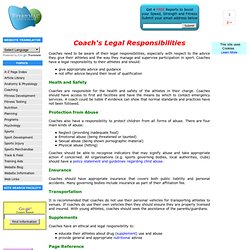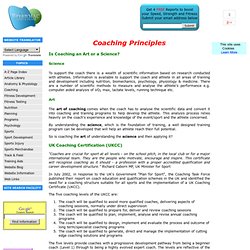

Sports Coaching Brain. Good Detail from Coaches Colleague. View Shorter Version In present day society there are many characteristics, personality traits and responsibilities that an individual must interconnect, balance and perfect if they are going to fulfil their full potential as a coach and provide their players with the highest level of guidance possible.

Many assume that a great coach is great because they have all in-depth technical knowledge and the ability to spot and rectify faults. The technical knowledge and other occupational requirements are important and they are the qualities instantly analysed when observing a coach. However these qualities are only the tip of the ice berg, with many others not instantly visible. The coach will also possess personal traits that compliment their occupational attributes, resulting in a greater coaching performance.
The major qualities in each category are discussed below: Personal The majority of individuals can be taught to coach. A Good Communicator Open-Minded Fairness and Equality Patient. Roles and responsibilities of a sports coach. Skills and Roles. The United Kingdom Coaching Strategy describes the role of the sports coach as one that "enables the athlete to achieve levels of performance to a degree that may not have been possible if left to his/her own endeavours". Dyson speaking to the 19th session of the International Olympic Academy, Greece 1979, widened the horizon when he said that "the wise coach develops not only the fullest physical potential in his charges, but also those capacities and habits of mind and body which will enrich and ennoble their later years".
I also believe the role of the sports coach is to create the right conditions for learning to happen and to find ways of motivating the athletes. Most athletes are highly motivated and therefore the task is to maintain that motivation and to generate excitement and enthusiasm. The role of the coach could be quite daunting since the above implies what could be construed as quite awesome responsibility, especially for the part-time non-professional. Coaching Roles Safety. Legal Responsibilities. Coaches need to be aware of their legal responsibilities, especially with respect to the advice they give their athletes and the way they manage and supervise participation in sport.

Coaches have a legal responsibility to their athletes and should: give appropriate advice and guidance not offer advice beyond their level of qualification Heath and Safety Coaches are responsible for the health and safety of the athletes in their charge. Coaches should have access to first aid facilities and have the means by which to contact emergency services. Protection from Abuse Coaches also have a responsibility to protect children from all forms of abuse. Neglect (providing inadequate food) Emotional abuse (being threatened or taunted) Sexual abuse (being shown pornographic material) Physical abuse (hitting) Coaches should be able to recognise indicators that may signify abuse and take appropriate action if concerned.
Insurance Transportation Supplements Page Reference The reference for this page is: Coaching Principles from the Mac Daddy. Is Coaching an Art or a Science?

Science To support the coach there is a wealth of scientific information based on research conducted with athletes.